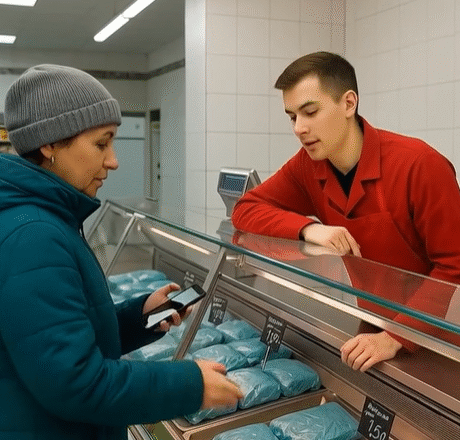Every morning, as the marketplace came alive with chatter and the scent of fresh bread and herbs, a frail woman appeared at the butcher’s stall. She was small, stooped with age, her silver hair tucked beneath a faded scarf.
Her coat, worn and patched at the elbows, hung loosely on her frame. In her hands, she pushed an old metal cart that squeaked with every step.
“Forty kilos, same as always,” she would say, her voice barely more than a whisper. She counted out the money carefully, every bill crisp and exact, and waited patiently as the young butcher wrapped the heavy slabs of beef.
At first, he thought little of it. Perhaps she had a large family or owned a small restaurant somewhere. But when the same order came every single day—forty kilos, no variation—his curiosity began to stir.
The butcher, no more than thirty, had seen his share of eccentric customers, but this woman was different. She never smiled, never lingered to chat, and carried with her a faint metallic scent, like rust after rain. It wasn’t long before whispers began to spread among the market vendors.
“She must be feeding a pack of dogs,” one said.
“No, no,” another insisted. “I heard she’s running some kind of underground kitchen.”
“Or maybe,” someone else murmured, “she’s stocking up for the winter. You know how these old folks are.”
The butcher brushed off the gossip at first. But with each passing week, his curiosity deepened into unease. Where could so much meat possibly be going?
Finally, one cold evening, he decided to find out.
He waited until the market was nearly empty and watched as the woman began her slow journey home, pushing her heavy cart down snow-dusted streets. She moved steadily, despite her age, turning away from the lights of the town toward the outskirts where the roads grew darker and quieter.
He followed her from a distance, his breath visible in the freezing air. She passed shuttered shops, deserted lots, and finally stopped in front of an abandoned factory—a massive, crumbling structure that had been closed for years.
To his surprise, she slipped through a rusted metal door and disappeared inside, dragging her cart with her. Twenty minutes later, she reemerged empty-handed. The next day, she did the same.
On the third evening, his curiosity overwhelmed his fear. He waited until she went in, then quietly followed.
The inside of the old factory was cold and damp, filled with the sharp tang of metal and something else—something wilder. The sound of his own heartbeat echoed in his ears. Then came another sound: a deep, guttural rumble that froze him in place.
Peering through a crack in the wall, he saw something that made his breath stop.
In the middle of the vast, dimly lit hall were four enormous lions. Their golden eyes gleamed in the half-light. The floor was scattered with bones and scraps of raw meat. And there, in a battered armchair, sat the old woman.
She was gently stroking one of the lions, her wrinkled hand running through its thick mane. Her voice was soft but steady.
“Easy now, my darlings… soon you’ll have another fight. The people will come again, and you’ll show them what you’re made of.”
The butcher’s knees nearly gave out. One of the lions roared, a deep, thunderous sound that shook the entire building. Startled, he stumbled backward. The woman turned sharply, her eyes meeting his through the gloom.
“What are you doing here?” she hissed, her voice low and fierce.
Terrified, the butcher ran. He didn’t stop until he reached the street, where he fumbled for his phone and called the police.
When officers arrived, they found the woman still inside, sitting quietly among the great cats. What they uncovered left everyone in shock.
Years earlier, she had been a zoologist. When the local zoo closed down, she had taken in several lions to save them from being destroyed. For a time, she truly had cared for them—feeding them, sheltering them in the abandoned factory, doing what she could with the little she had. But as her money ran out and her isolation deepened, her good intentions had slowly turned desperate.
The police discovered that she had started charging small underground groups to watch the lions “train” and fight, using the money to buy more meat. It had begun as an act of compassion, but over time, it twisted into something dangerous.
As the authorities removed the animals and took the woman into custody, the butcher stood silently outside the old factory. He felt no anger—only sorrow. Beneath her frail frame and strange behavior, she had been a woman trying to hold on to something she loved, long after the world had forgotten about her.
The story spread quickly through town. Some called her cruel. Others pitied her. But for those who knew her past, she remained a tragic reminder of how easily loneliness can turn even kindness astray.
Today, the butcher shop still stands in the same market, and sometimes, when the snow begins to fall, the young butcher remembers the old woman and her heavy cart. He remembers the strange, sad look in her eyes—and wonders whether her lions ever truly frightened her, or if they were simply the last companions she had left.
